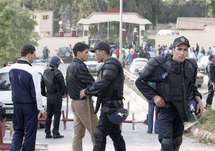Algeria says has 'turned the page' on riots
Amer Ouali
ALGIERS, Amer Ouali- Algerian authorities on Sunday insisted the country had "turned the page" on nationwide food riots that left five people dead and vowed to punish those responsible.
A day after the government imposed urgent cuts on import duties and taxes in a bid to curb soaring food prices, witnesses said calm appeared to return to all cities and towns that had been hit by rioting.
"From our side, we consider that we have turned the page" on the riots, Interior Minister Dahou Ould Kablia told AFP in an interview.

Protesters "involved in causing serious injuries and in attacks against citizens will be the responsibility of the criminal courts and will be judged", he said.
The rioting erupted amid deep anger at increases in prices for basic goods, some of which have risen by as much as 30 percent since January 1.
The interior ministry has said three people were killed in the riots -- one shot dead while trying to break into a police station, one found on the streets with head wounds and one found in a hotel burned down by rioters.
A young man was also shot dead while trying, along with his father, to protect their bar from rioters, several sources said. And a 65-year-old taxi driver died Sunday in hospital after having inhaled gas used by security forces against protesters, a hospital source said.
Ould Kablia said the level of damage was "immense" and that rioters had targeted mainly banks, retail shops and public buildings.
Stores nonetheless began to reopen in Algiers on Sunday and train traffic, interrupted since Thursday, resumed across the country.
There was no sign yet of the promised reduction in food prices, however.
At the height of the crisis on Saturday, the government announced a temporary 41 percent cut in customs duties and taxes on sugar and food oils, and said the effects of the cut should trickle down to consumers soon.
"I paid 15 dinars (0.15 euros) for a croissant which I normally buy for 10 dinars and the baker explained that this was because of the higher price of sugar," said an electrician who identified himself only as Murad.
The unrest in Algeria, which is still under a state of emergency following a civil war with Islamist extremists in the 1990s, came as the UN Food and Agriculture Organisation food price index hit its highest level since it began in 1990.
Ould Kablia blamed the rioters themselves for the unrest, saying "there is a higher level of violence (in youth) who come from this period of the 1990s".
About 75 percent of Algerians are under the age of 30, and 20 percent of youths are unemployed, according to the International Monetary Fund. Many are well-qualified but cannot find work.
The General Union of Algerian Workers and Trade Minister Mustapha Benbada had accused producers and wholesalers of inflating prices ahead of new measures requiring them to systematically bill for their goods.
Neighbouring Tunisia meanwhile remained gripped in its own protests over food prices and unemployment Sunday, with officials there saying 14 people had been killed in clashes between protesters and security forces.
--------------------------------------------------------------------------------------